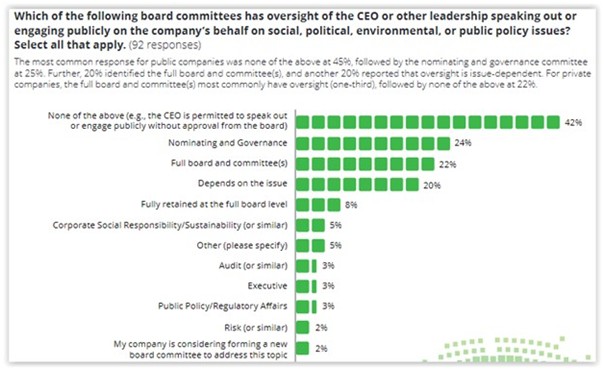Society public and private company members responding to the most recent Society/Deloitte Board Practices Quarterly survey: “The outspoken corporation” provided insights on how their companies approach public engagement on social, political, environmental, or public policy issues, and the related role of the board.
Company leadership is speaking out – About half of respondents reported that their CEO or other officer(s) or director(s) had spoken out publicly on the company’s behalf over the past year on a social, political, environmental, or public policy issue, either in response to events or proactively. Racial justice was the most common topic addressed, followed by social justice and environmental issues.
Designated spokesperson(s) – The CEO is the most commonly designated spokesperson if/when companies decide to speak out or engage publicly on social, political, environmental, or public policy issues.
Policies/frameworks for speaking out vary – Of the majority of companies that have a document or policy that governs or specifies whether or when company leadership is allowed to speak out or engage publicly on social, political, environmental, or public policy issues, nearly one-third reported having a company-specific framework, while others memorialize their policy in their code of ethics, corporate governance guidelines, and/or other documents including Reg. FD policies, and communications and disclosure policies/guidelines.
 Management’s role – About half of companies have a management-level committee, group, or individuals that oversee the CEO or other leadership speaking out or engaging publicly on social, political, environmental, or public policy issues. For companies with a management-level committee (or similar), their role most commonly consists of assessing potential benefits and risks associated with taking a position on a certain issue, and articulating why the issue is or is not important or appropriate for the company to take action.
Management’s role – About half of companies have a management-level committee, group, or individuals that oversee the CEO or other leadership speaking out or engaging publicly on social, political, environmental, or public policy issues. For companies with a management-level committee (or similar), their role most commonly consists of assessing potential benefits and risks associated with taking a position on a certain issue, and articulating why the issue is or is not important or appropriate for the company to take action.
Topic sometimes on the agenda – Although a plurality of companies said that the topic of whether and/or when the company or any of its officers or directors should speak out on the company’s behalf on political, social, environmental, or public policy matters had not been discussed by their board or any of its committees over the past year, 8% said the topic is under consideration and/or on an upcoming meeting agenda, and 11% said they were unsure.
Oversight responsibility varies – A plurality of companies (42%) said that their CEO or other leadership can speak out or engage publicly on the company’s behalf on political, social, environmental, or public policy issues without board approval. The balance identified the Nom/Gov Committee (24%), full board and committee(s) (22%), full board (8%), and others, as the body/bodies with oversight responsibility; 20% said that the oversight body is dependent on the issue.
 Board oversight documentation – For those companies that have board/committee oversight and that have memorialized it, most do so in their relevant committee charters and/or corporate governance guidelines.
Board oversight documentation – For those companies that have board/committee oversight and that have memorialized it, most do so in their relevant committee charters and/or corporate governance guidelines.
Stakeholder engagement – At least half of companies indicated that their stakeholders had contacted or requested to engage with management, the board/board committee, or individual directors on one or more political, social, environmental, or public policy matters over the past year – most commonly on ESG, climate change, and DE&I; some cited lobbying, legislative initiatives, and political contributions.
Respondents consisted of Society member corporate secretaries, in-house counsel, and other in-house governance professionals with public companies (90%) and private companies (10%) of varying sizes and industries. Access the survey results online and by company demographics here.
As previously reported, speaking out publicly on these types of issues, particularly when the topics are unrelated to the business, poses reputational and other risks. Management is strongly encouraged to work with the board on establishing and documenting a framework that addresses whether and when CEOs or other company leadership should speak out on political, social, environmental, or public policy issues and the nature and extent of board involvement.
See our recent reports on this topic, e.g.,: “CEOs Speaking Out on Controversial Issues: Risk Mitigation,” “To Speak or Not to Speak? ; these reports: “Public Looking to CEOs to Speak Out on Economic & Social Issues,” and “Consumers Expect Companies to Walk Their Talk,” “CEO/Leadership “Activism” Guidance,” “Board Oversight: CEO ’Activism’” and “Whether & How to Engage on Political & Social Issues” and additional information & resources on our Activism page »CEO/Leadership.
This post first appeared in the weekly Society Alert!